Olympics opening ceremony: a little Gaga, a lot of spectacle, and universal uplift
How Paris 2024’s Olympics opening ceremony set spirits – and much else – soaring, embracing the Seine, the streets and the skies. Craig McLean reports
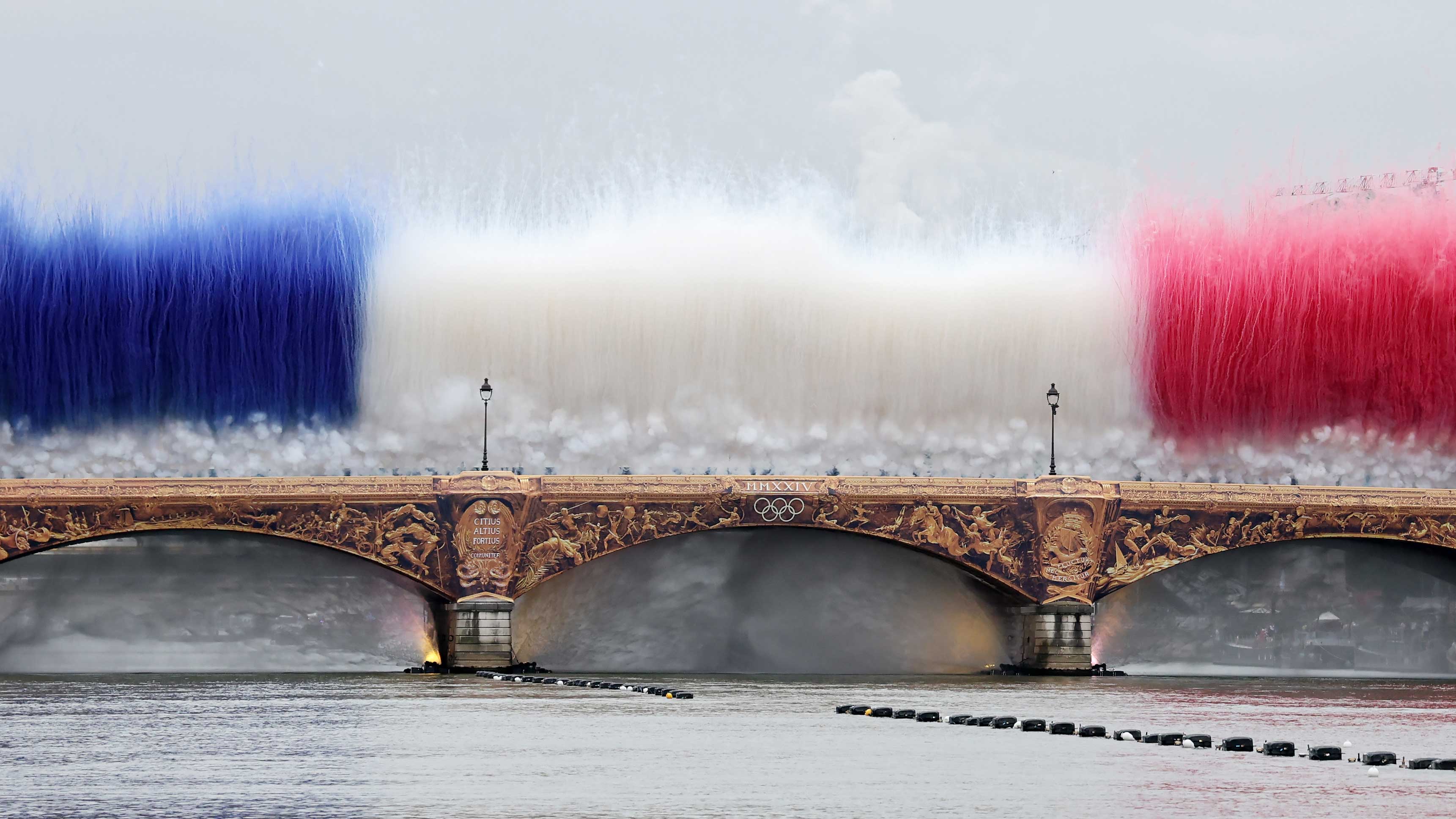
‘I think The Queen must have known, because I was involved, that they were going to make it a People’s Games. So there was a chance [for her] to take a risk with it.’
So said Danny Boyle to me in early 2013. The Oscar-winning filmmaker was reflecting on Isles of Wonder, the much-admired, kaleidoscopic, best-of-British Opening Ceremony he’d directed for the previous summer’s London 2012 Olympics. And my, how he’d delivered. Pistols (Sex), Poppins (Mary) and a parachuting monarch strapped to James Bond – all filled the purpose-built stadium in the city’s eastern boroughs for a magical night that managed to celebrate the NHS, Shakespeare, UK pop culture and the Games themselves.
The organisers of last night’s Paris 2024 Opening Ceremony wanted to make their curtain-raising spectacle a people’s party, too. So much so that they ditched decades of tradition and took their event out of an enclosed, ticketed stadium and threaded it through the bustling streets and magnificent buildings – and more importantly, along the iconic arterial waterway – of the French capital.
Paris 2024 Olympics opening ceremony highlights
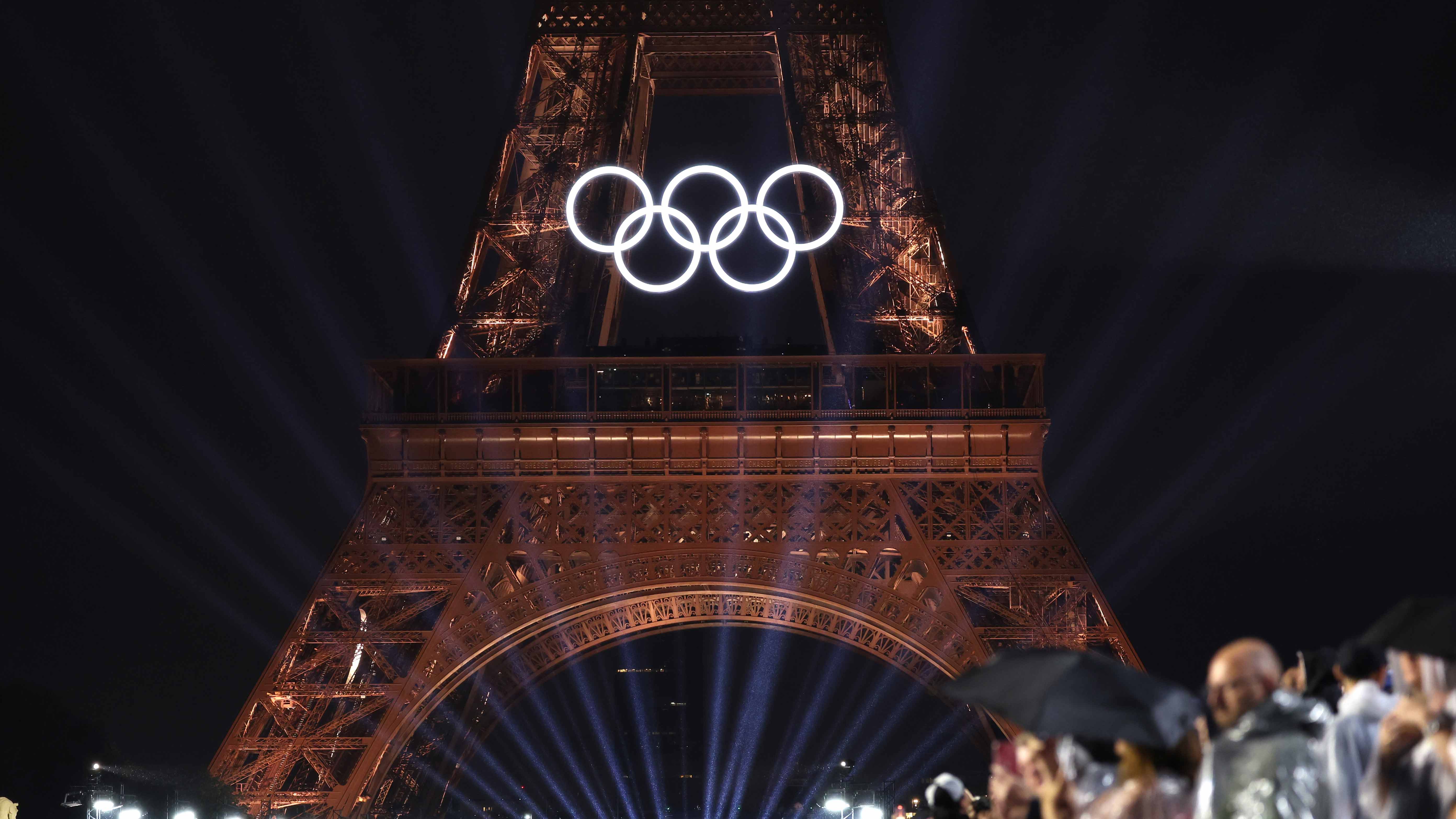
With 320,000 spectators lining the banks of the Seine watching a flotilla of 85 barges ferrying athletes from 205 countries along the 6.5km route, and 18 bridges and multiple embankment locations serving as stages for 12 ‘artistic tableaux’, this was the event as a river of spectacle.
‘An opening ceremony like no other,’ said BBC commentator Hazel Irvine at the beginning of artistic director Thomas Jolly’s four-hour welcome bash that integrated the athletes’ parade with the festivities. ‘For us, it’s a trip into the unknown,’ added co-presenter Andrew Cotter, just a little apprehensively, of an event that, due to its very public nature, occupying the entire heart of Paris, had been impossible to rehearse. Certainly, it got off to a splashy start, and not just because near-incessant rain meant there was as much water coming from above as from below.
After an early, torch-carrying appearance from French sporting hero Zinedine Zidane, and as the first boats, carrying the teams from Greece and the Refugee Olympic Team, ploughed up the Seine, Lady Gaga descended mock Metro steps to the river’s edge. She gave her lusty all to a bit that suggested Liza Minelli in Cabaret, with black-clad dancers fluttering pink (fake) ostrich feathers in front of her and a choreographed horn section parping away on the quayside. But for all her superstar-power, the lopsided jazz of classic 1970s showtune 'Mon Truc En Plume' let her down in a skit that felt less Moulin Rouge than Benny Hill.
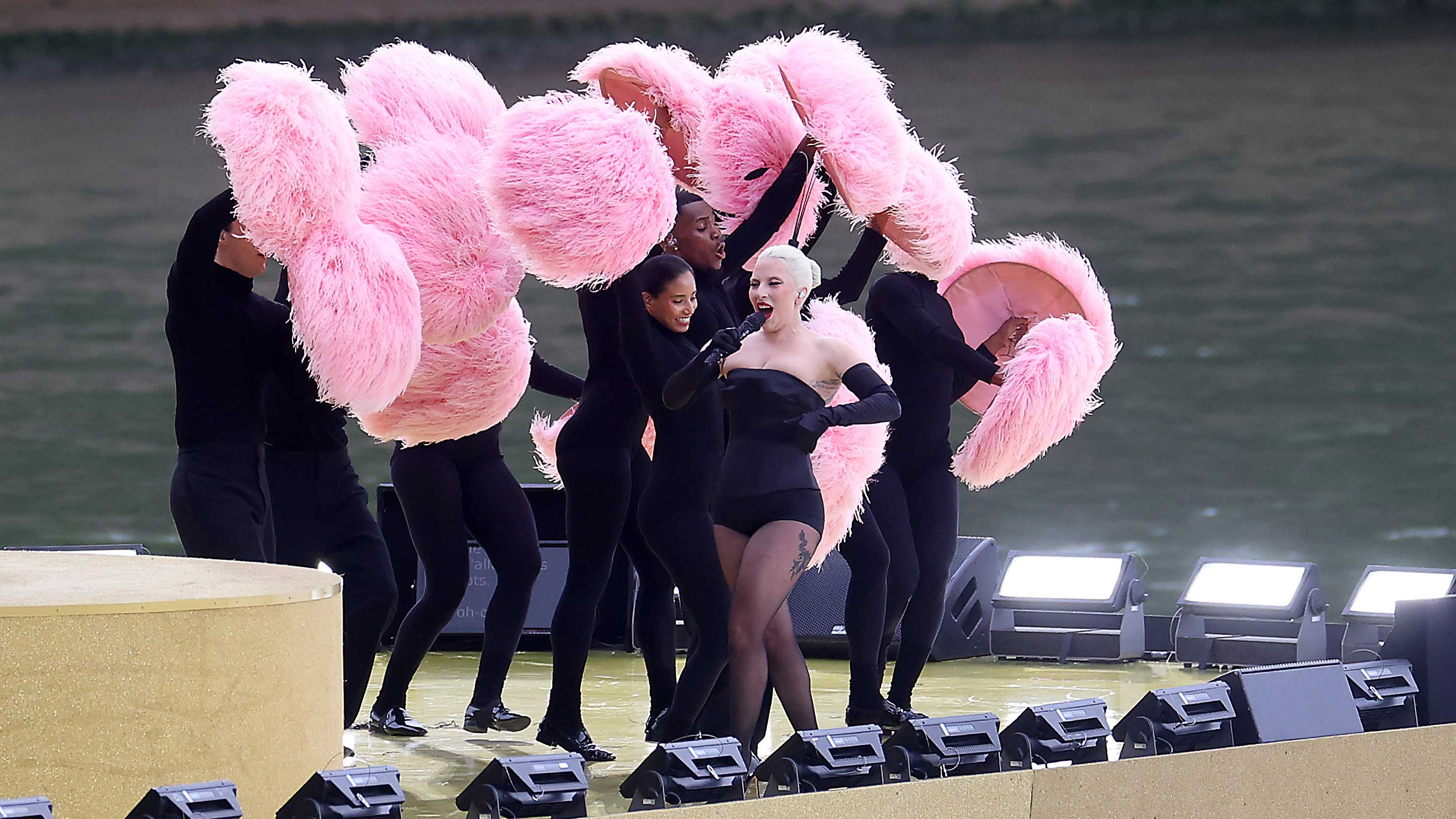
Speaking of the iconic French cabaret club: after the boats from Belize (shout out to their plucky single athlete), Benin, Bermuda and Bhutan, the cruise-by of the Cambodian and Canadian teams was flanked by can-can dancers all the way from Montmartre institution that gave the world the high-kicking dance.
Wallpaper* Newsletter
Receive our daily digest of inspiration, escapism and design stories from around the world direct to your inbox.
They, like dancers elsewhere on the river banks, were entirely clad in pink, the organisers taking the ‘la vi en rose’ prettily and literally (see our interview with Paris 2024’s director of design Joachim Roncin). The rain-spattered cameras occasionally cut to a mysterious, hooded figure of the torch-bearer, traversing the city en route to the Olympics cauldron. Now she/he was on the Parisian rooftops, doing a bit of non-Olympic sport parkour, ‘which is French for bouncing around a bit’, said Cotter wryly. ‘I do have a French degree,’ he assured us.
All the while, those tableaux unfolded, some more comprehensible than others. After the ‘Enchanté’ chapter came ‘Sychronicité’. It opened with pre-recorded images of craftspeople engaged in the reconstruction of Notre Dame after the devastating fire of 2019. Their tools and movements inspired the music and choreography of a 500 dancers-strong segment that featured some hanging off the scaffolding surrounding the cathedral, and others down by the river, kicking up spray in glittering gold troughs of water.
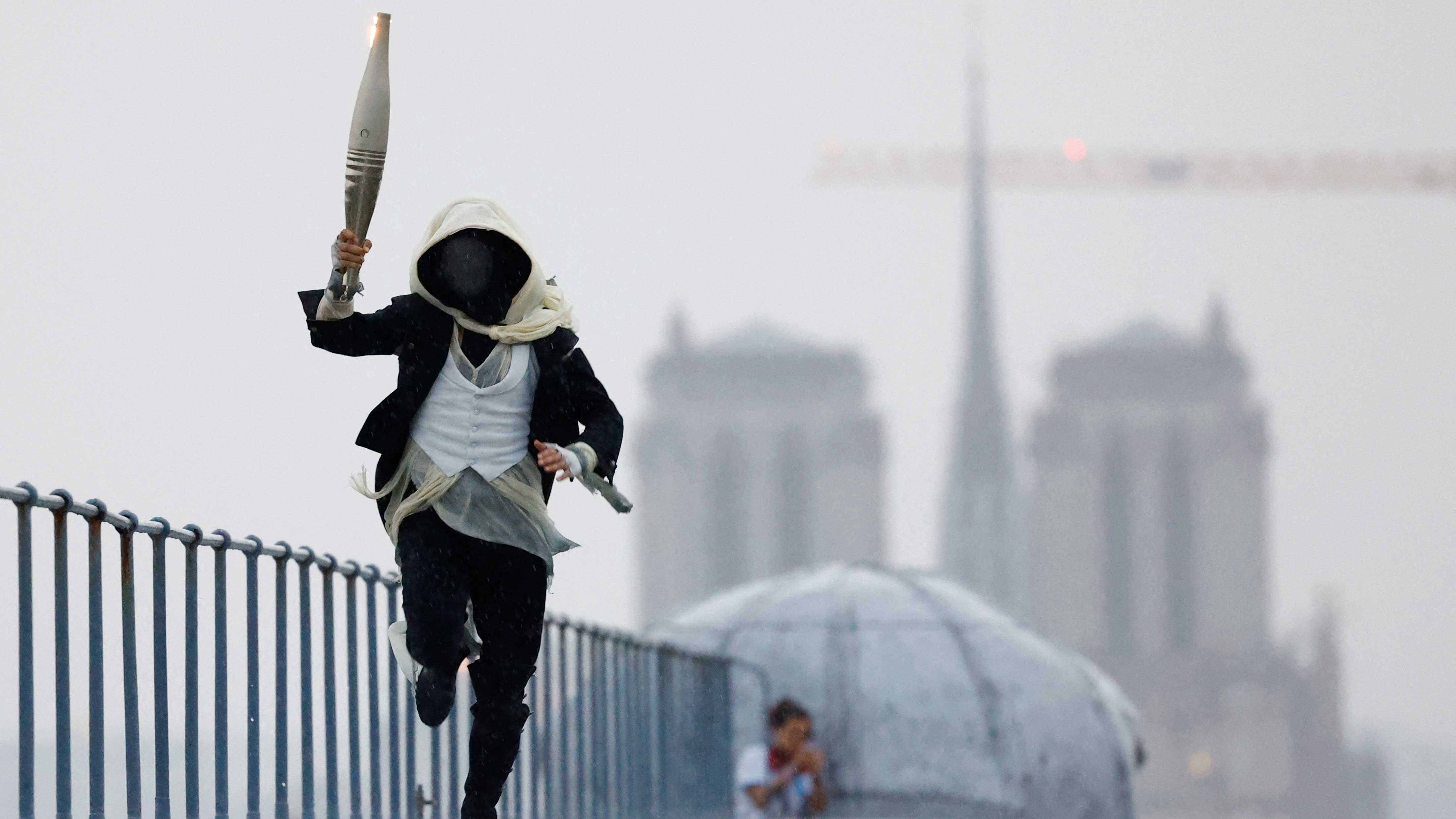
The parkour torch bearer en route
Meanwhile, back on dry-ish land, there was savvy product placement for Louis Vuitton as the organisers gave us the narrative of the making of the Chaumet-designed Olympic medals, each containing a portion of steel from the Eiffel Tower, the gold, silver and bronze precious cargo then wheeled through the streets in specially created LV luggage cases.
For ‘Liberté’, the members of rock band Gojira were stationed on precarious platforms high up the exterior of another grand building, blasting out heavy-metal riffs while an opera singer sailed by on a wheeled galleon, part of the emblem of the city of Paris. Then, as the sound of the rain competed with a blast of Carmen, it was into another set-piece: acrobats scything through the grey sky on giant, swooping poles as the shape of a giant pink heart, formed from smoke, drifted beneath the clouds. The City of Love was giving us just that. And it was giving lots and lots more. Sometimes too much. French-Malian star Aya Nakamura, the most listened to French-language singer on Spotify, performed her 2019 hit ‘Pookie’ backed by 60 military-band musicians from the Republican Guard – a brilliant mash-up, showcasing old and new France.
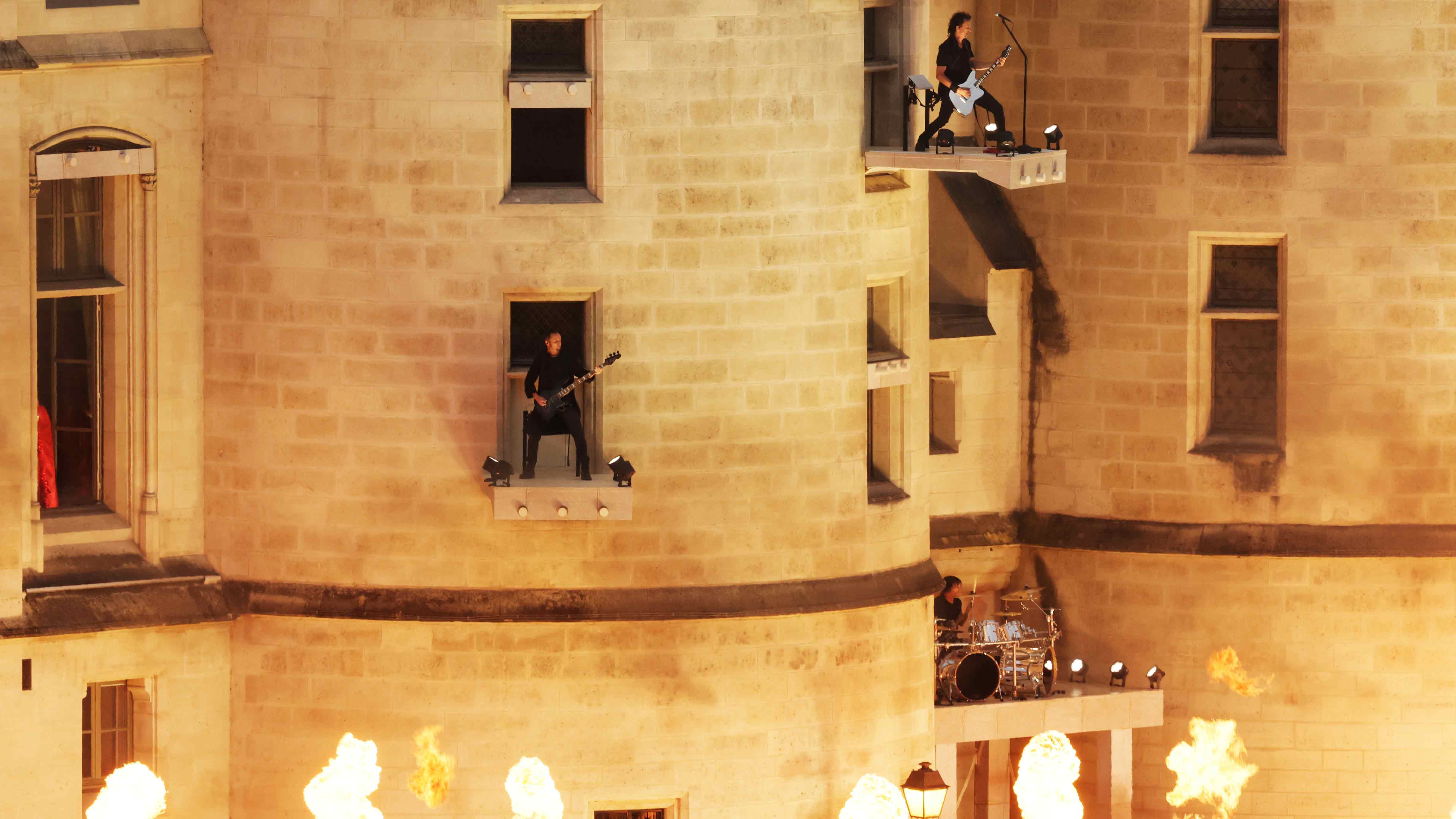
‘Festivité’ gave us a runway show on a bridge, seated dancers making up the FROW, a spotlight on Paris as the world capital of fashion. ‘Sororité’ gave us ‘La Marseillaise’ sung from atop another grand building by mezzosoprano Axelle Saint-Cirel as ten gold statues of famous French women rose from riverside columns – botanist Jeanne Barret, femme de lettres Christine de Pizan, anarchist and feminist activist Louise Michel… But no, no Celine Dion. Not yet.
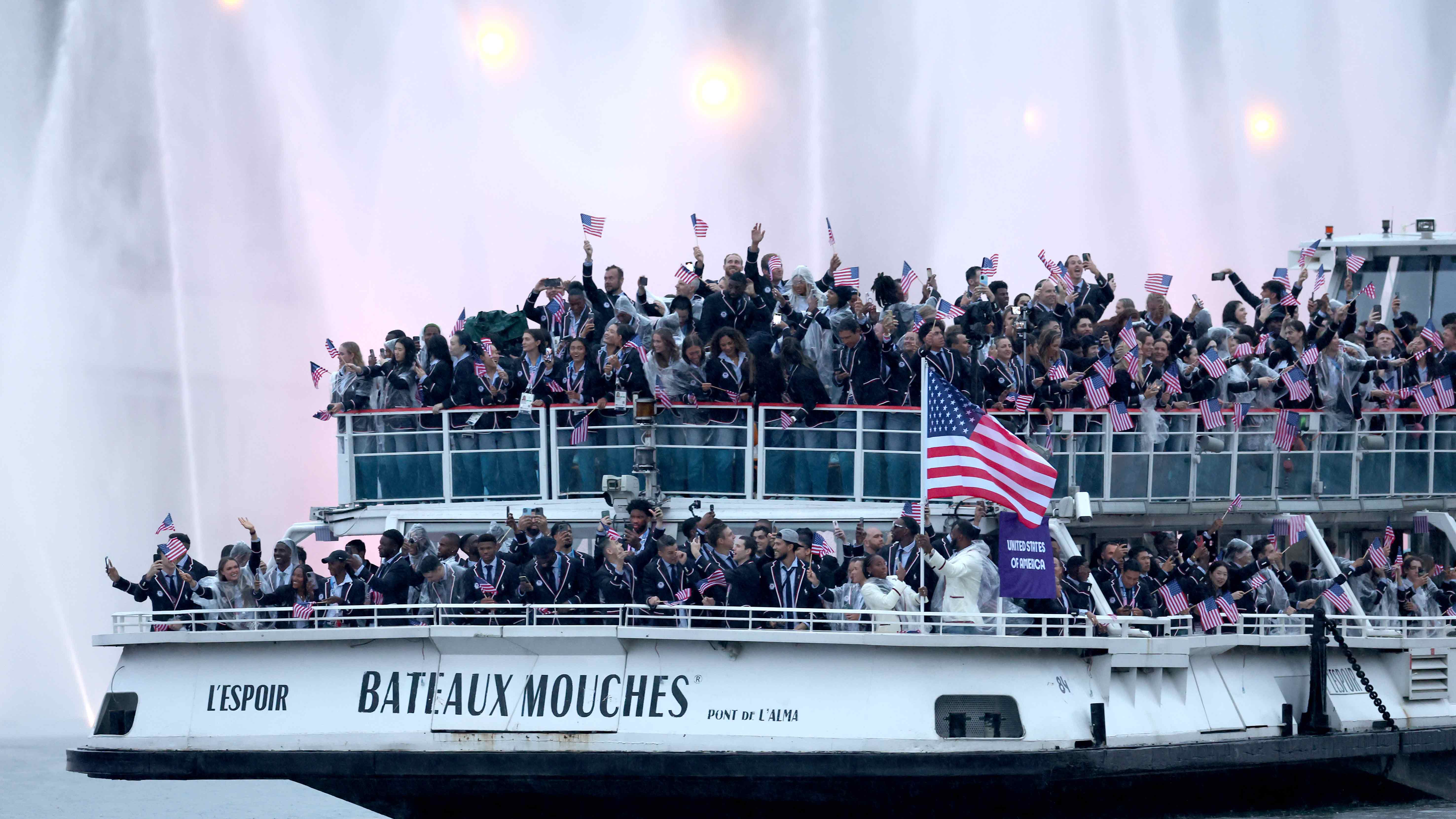
Heading towards the fourth hour, things lagged. The athletes’ boats had all arrived, but the physical embodiments of the games hadn’t. After an impressive but seemingly interminable gallop up the middle of the Seine by a gendarmerie horsewoman on a cool, glass robo-nag, the Olympic flag was taken ashore and carried to a temporary stadium built under the Eiffel Tower.
One hundred years on from the last Paris games, there was speechifying from suited International Olympic Committee bosses; justifiably proud acknowledgement of France’s role in creating the modern games courtesy of ‘father of the Olympics’ Pierre de Coubertin (the Olympic flag was his design); and impassioned calls for unity, compassion and belief in the true spirit of the games in a divided world. Then, the return of Zidane, who handed the torch to Rafael Nadal, who took it back to a motorboat. And on the torch continued, back up the river, as ‘Supernature’ by French house and disco godfather Cerrone blared out.
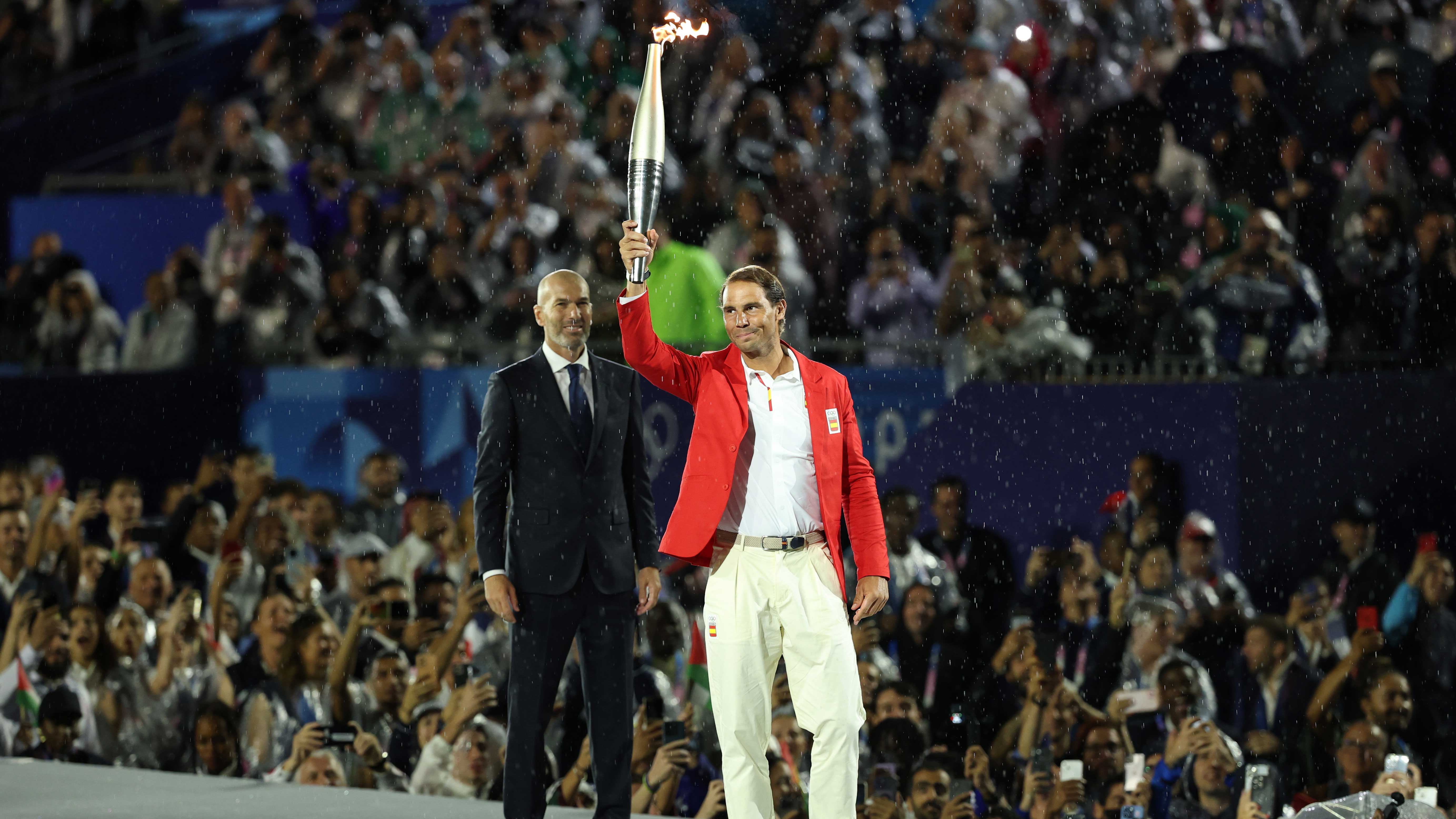
Rafael Nadal takes the torch from Zinedine Zidane
At last the flame came ashore and, carried by a final phalanx of French sporting heroes, lit the Olympic cauldron under a 30m-high hot air balloon (like parkour, another French invention). As the balloon rose into the air, we cut back to the Eiffel Tower, and there she was: the French-Canadian grande dame of the big moment, Celine Dion, singing 'Hymne à L'amour', made famous by Edith Piaf.
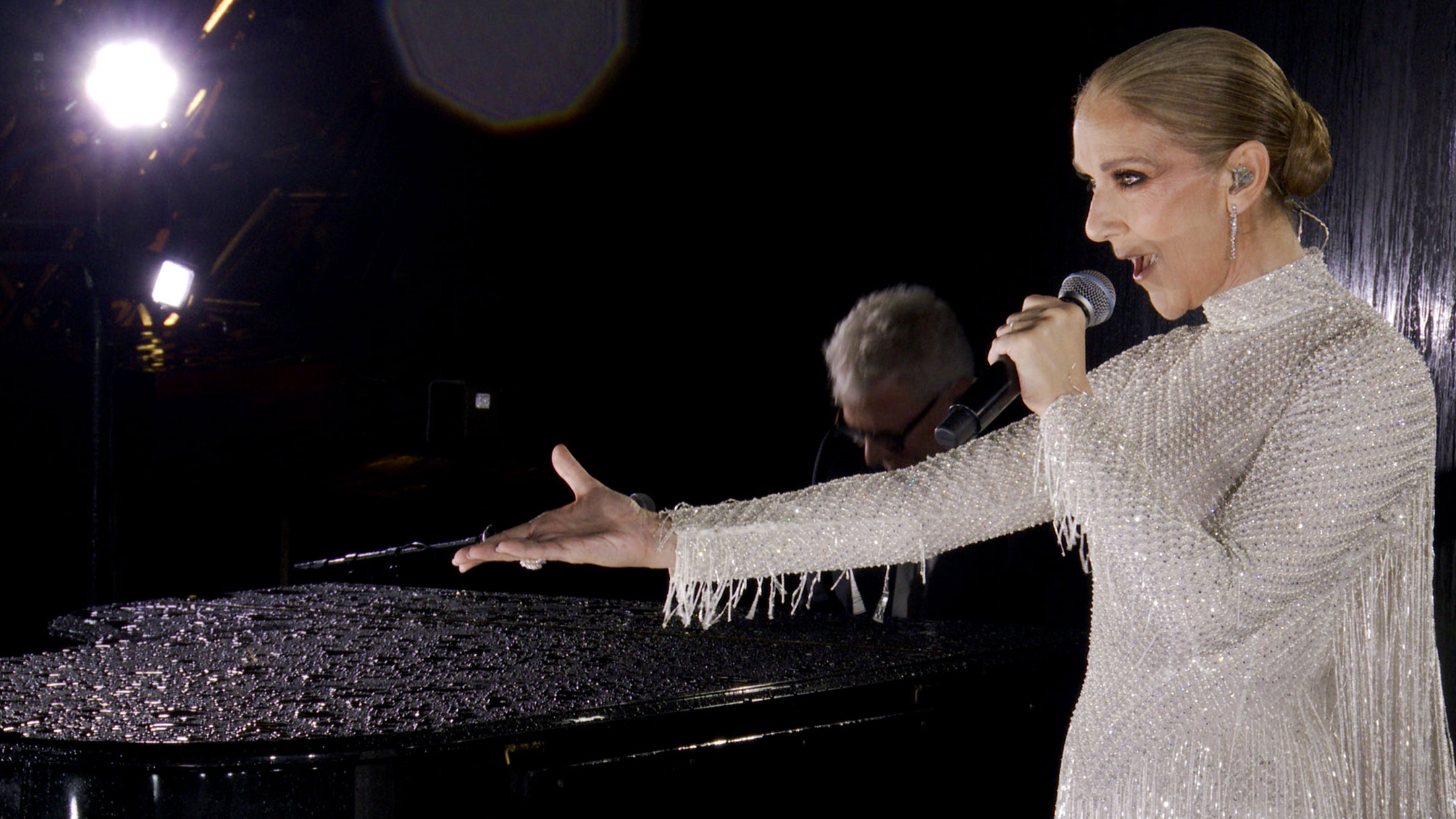
It was a spectacular end to an epic evening that, in the final moment, came together in the teeth of the elements and the frequent disconnect of wildly inventive, multiple moving parts scattered right through the heart of the city. ‘One of the most complex and difficult broadcasts ever undertaken, anywhere,’ concluded Hazel Irvine, and she wasn’t wrong. Paris had celebrated itself, and rightly so.
London-based Scot, the writer Craig McLean is consultant editor at The Face and contributes to The Daily Telegraph, Esquire, The Observer Magazine and the London Evening Standard, among other titles. He was ghostwriter for Phil Collins' bestselling memoir Not Dead Yet.
-
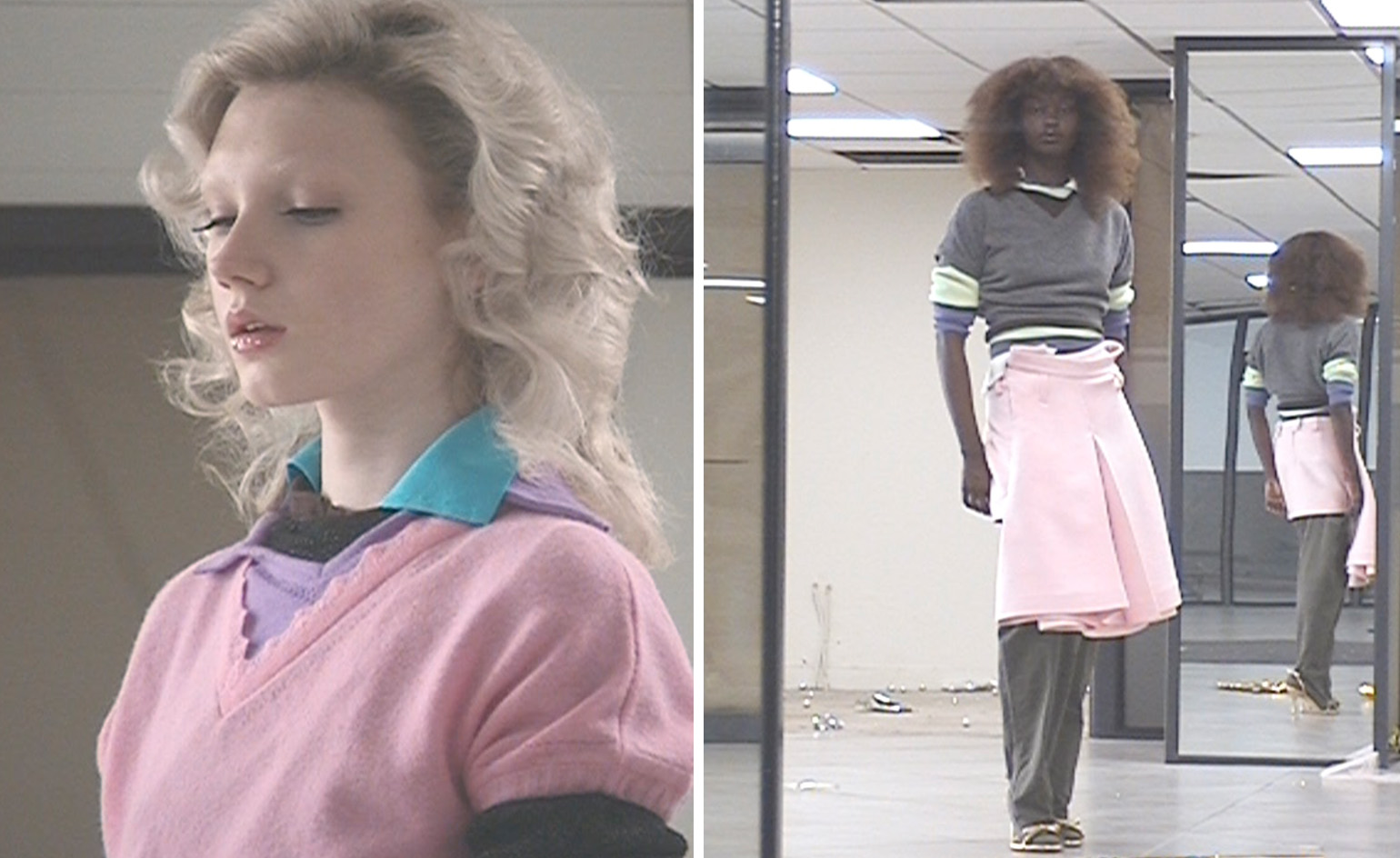 All-In is the Paris-based label making full-force fashion for main character dressing
All-In is the Paris-based label making full-force fashion for main character dressingPart of our monthly Uprising series, Wallpaper* meets Benjamin Barron and Bror August Vestbø of All-In, the LVMH Prize-nominated label which bases its collections on a riotous cast of characters – real and imagined
By Orla Brennan
-
 Maserati joins forces with Giorgetti for a turbo-charged relationship
Maserati joins forces with Giorgetti for a turbo-charged relationshipAnnouncing their marriage during Milan Design Week, the brands unveiled a collection, a car and a long term commitment
By Hugo Macdonald
-
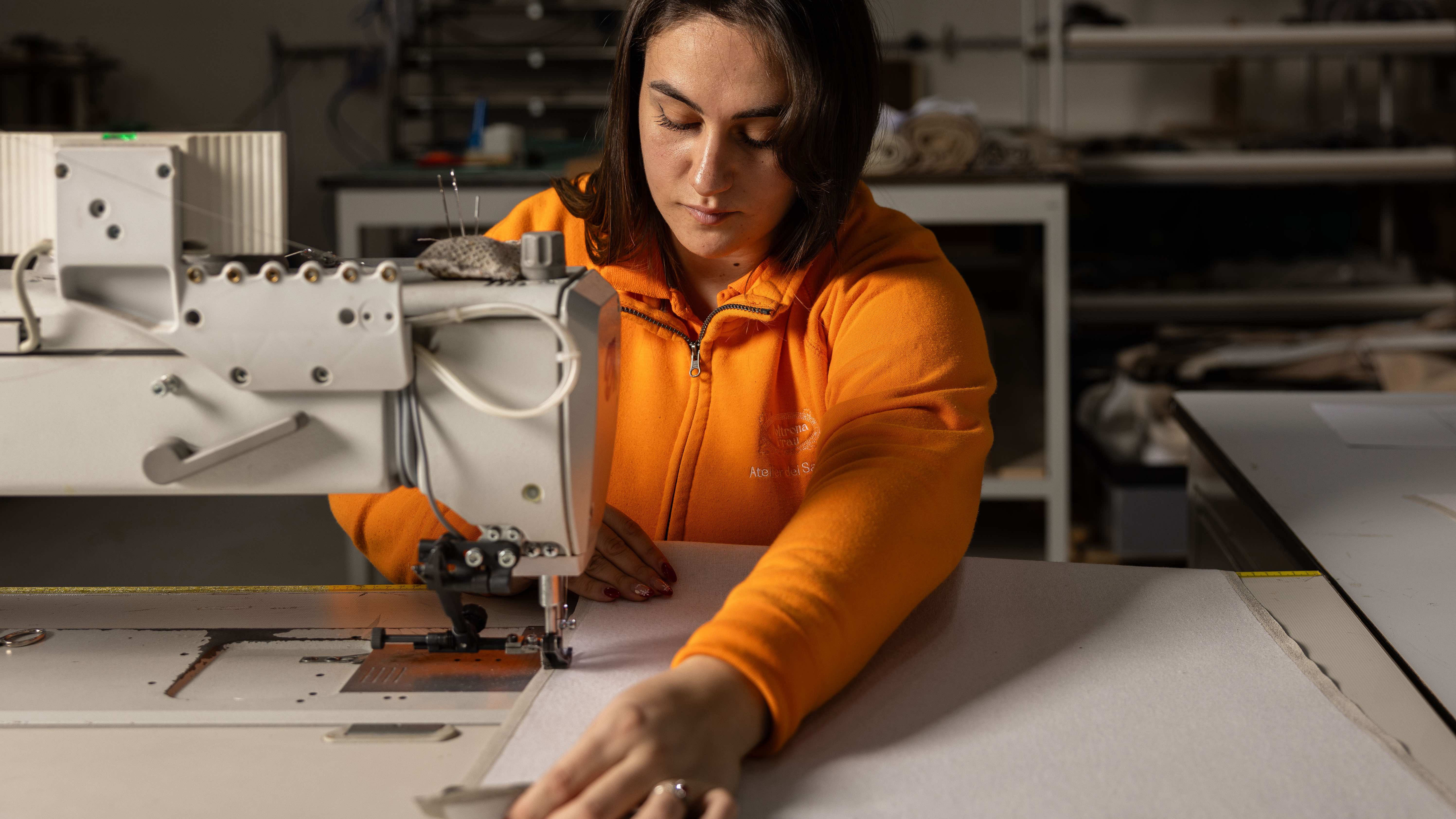 Through an innovative new training program, Poltrona Frau aims to safeguard Italian craft
Through an innovative new training program, Poltrona Frau aims to safeguard Italian craftThe heritage furniture manufacturer is training a new generation of leather artisans
By Cristina Kiran Piotti
-
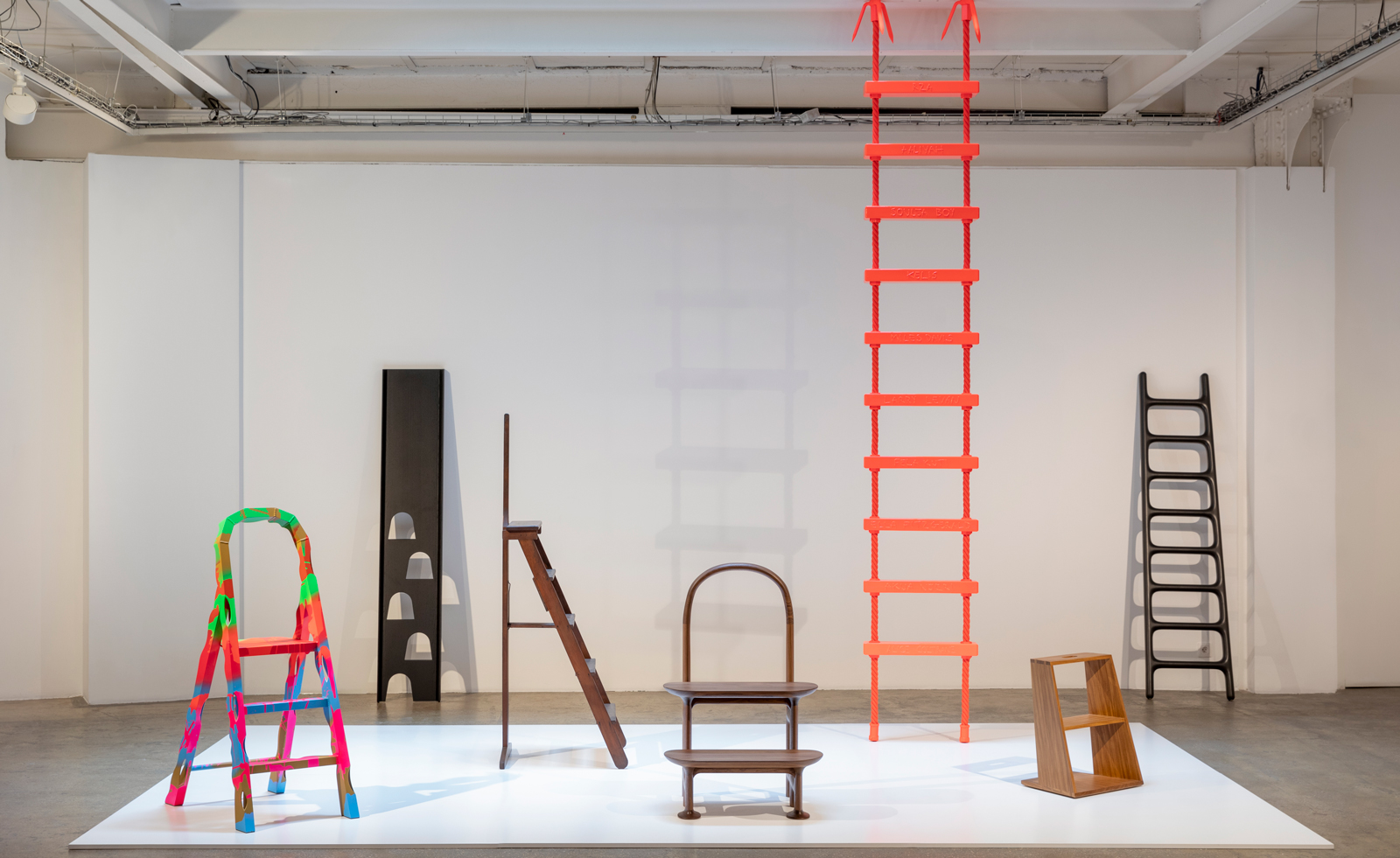 Step by step: Virgil Abloh, Jaime Hayon and more rethink the ladder at Galerie Kreo, Paris
Step by step: Virgil Abloh, Jaime Hayon and more rethink the ladder at Galerie Kreo, ParisA new exhibition at Galerie Kreo, ‘Step By Step’, invites more than 20 designers to rethink the ladder’s classic design
By Hannah Silver
-
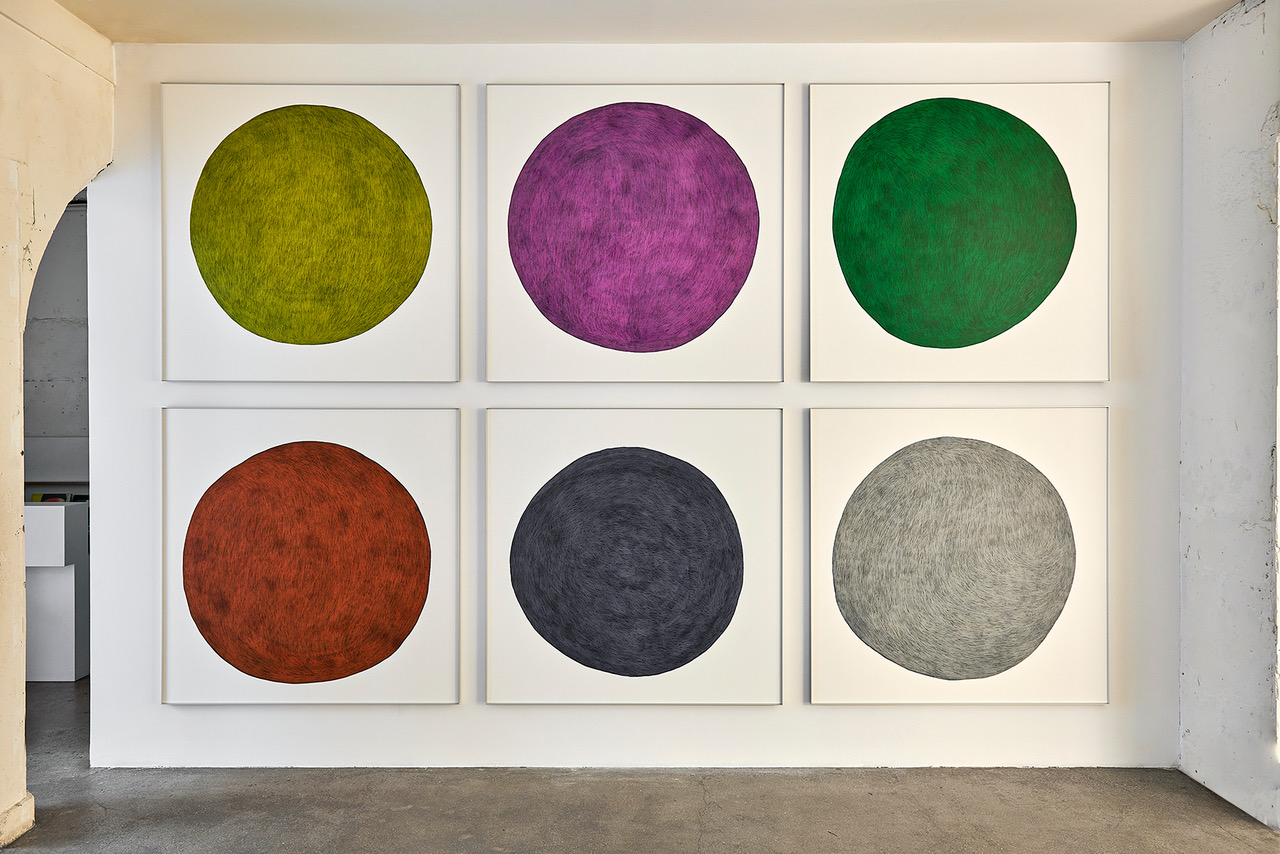 Virtually experience the shapes and colours of Pierre Charpin
Virtually experience the shapes and colours of Pierre CharpinTake a digital 3D tour of Pierre Charpin’s show ‘Similitude(s)’ at Paris’ Galerie Kreo that explores colour and geometry
By Ali Morris
-
 Re-living Pierre Paulin's 1970s Paris
Re-living Pierre Paulin's 1970s ParisTake a journey to 1970s Paris with Sotheby’s celebration of the work of French designer Pierre Paulin
By Laura May Todd
-
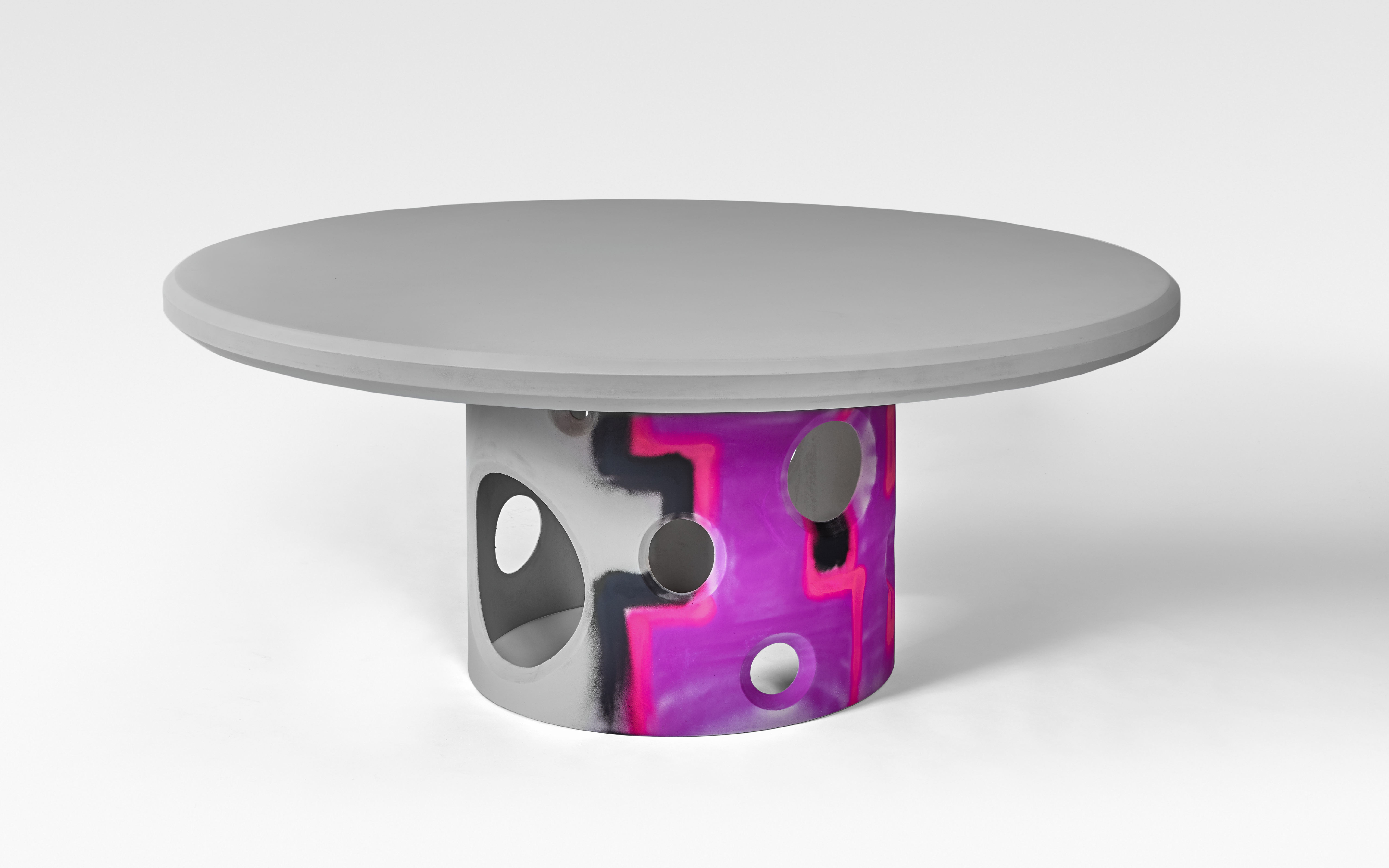 Cultural crossings at Maison et Objet January 2020
Cultural crossings at Maison et Objet January 2020In Paris this January, Maison et Objet (17-21 January) spanned fun rides, poetic performances and a Mediterranean brand launch
By Sujata Burman
-
 A new design, fashion and retail experience opens in Paris
A new design, fashion and retail experience opens in ParisNew brand La Manufacture offers French allure and Italian craft under the creative crew of Robert Acouri, Milena Laquale and Luca Nichetto
By Yoko Choy
-
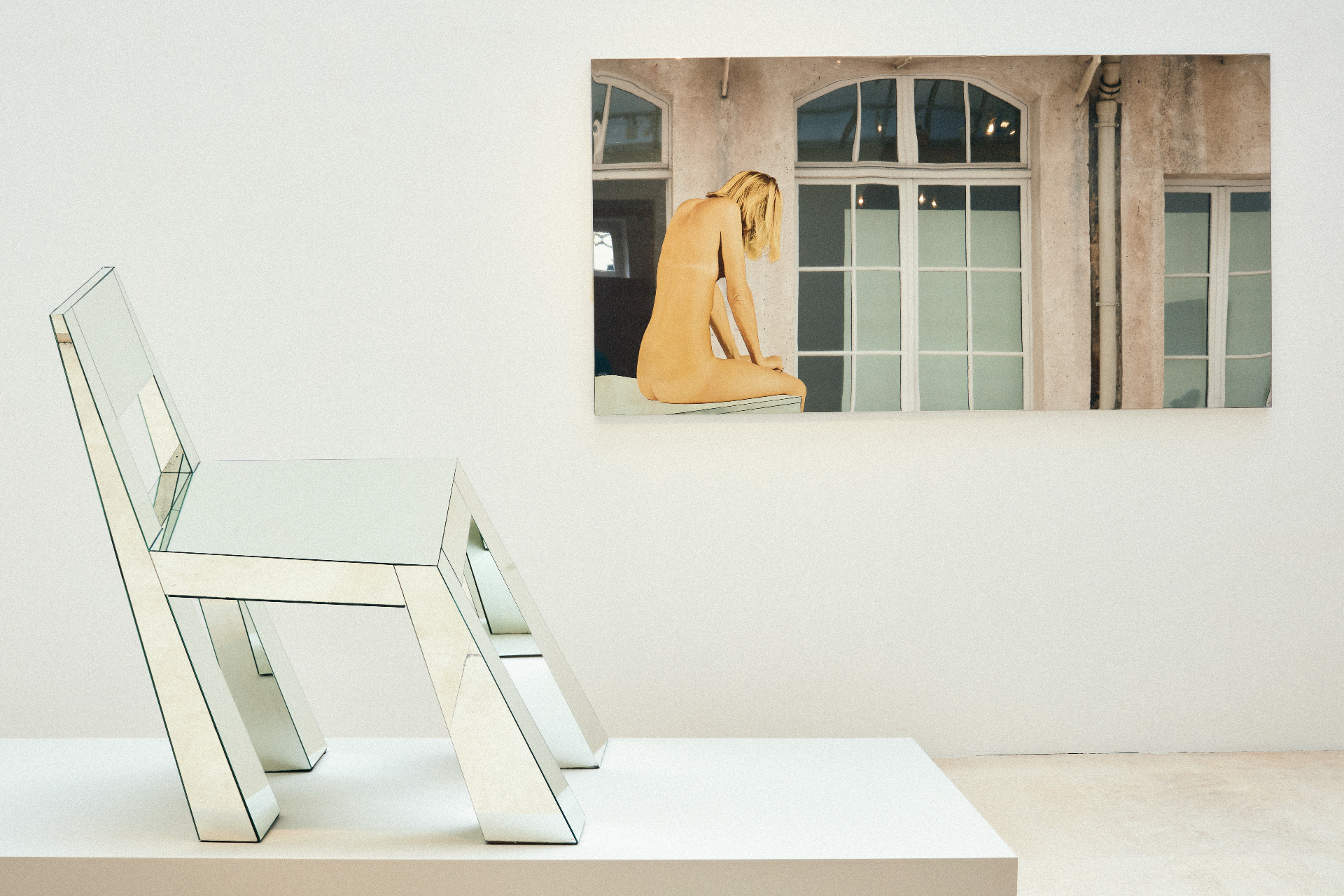 Charles Zana creates unexpected dialogues with 17 paired works in Paris
Charles Zana creates unexpected dialogues with 17 paired works in ParisIn exhibition Utopia, Charles Zana turns Tornabuoni Art in Paris into a salon of intimate conversations between Italy’s greatest post-war artists and architects
By Benoit Loiseau
-
 Make yourself at home with the works of Charlotte Perriand at Foundation Louis Vuitton
Make yourself at home with the works of Charlotte Perriand at Foundation Louis VuittonSee the full shoot in our October 2019 issue (W*247), on newsstands now
By Nick Vinson - Art Direction
-
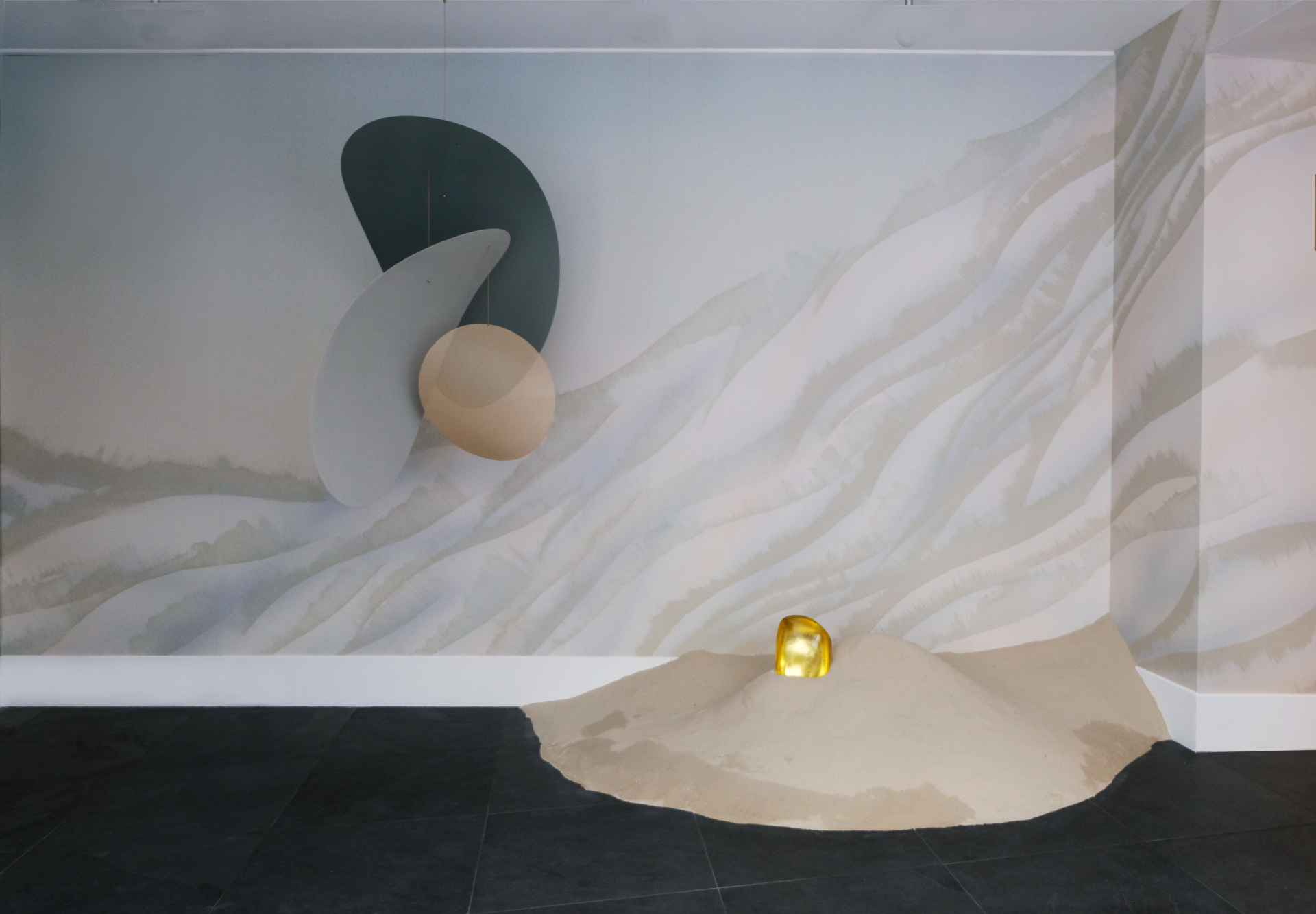 Unmissable moments from the Autumn edition of Paris Design Week
Unmissable moments from the Autumn edition of Paris Design WeekBy Sujata Burman